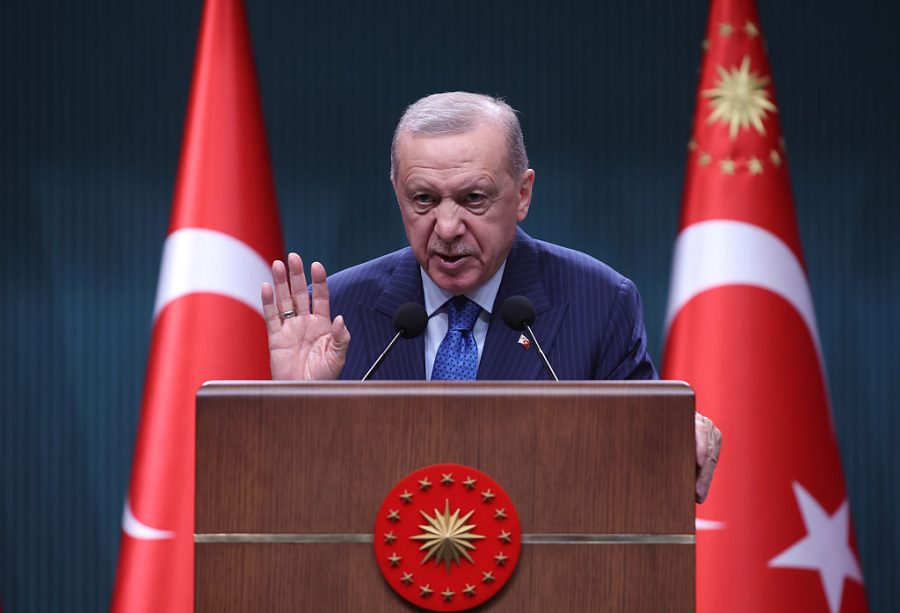As the Gaza ceasefire struggles into its second month, a significant difference between the position of Israel and that of its chief ally, the United States, on the way forward is emerging. This difference reflects broader gaps in perception in Jerusalem and Washington regarding the nature and motivations of the current forces engaged in the Middle East. The subject of that difference is Turkey.
The Turks have expressed a desire to play a role in the ‘international stabilisation force’ (ISF), which, according to President Donald Trump’s 20-point plan, is supposed to take over ground security control of Gaza from the IDF (and Hamas) in the framework of the plan’s implementation. Ankara appears to have played a significant role in securing the 10 October ceasefire between Israel and the Gaza Islamists. Now, Turkey wants a major role in future arrangements on the ground in Gaza, in both the military and civilian sectors.
Israel identifies Turkey in its current form as something very close to an enemy state
Israel is absolutely opposed to any Turkish role in future security arrangements in Gaza. Jerusalem appears to grudgingly accept Turkish civil involvement. Here also, however, given the background and orientation of the Muslim Brotherhood-associated Turkish IHH Humanitarian Relief Foundation, which is currently engaged in relief work in the Strip, there is extreme suspicion in Jerusalem. The IHH was the sponsor of the 2010 ‘flotilla’ to Gaza, in which a number of Islamist activists and their allies sought unsuccessfully to break Israel’s naval blockade on the territory. But while a Turkish civil role is probably unavoidable, Israel draws the line at a Turkish troop presence.
This is because Israel identifies Turkey in its current form as something very close to an enemy state. The reasons aren’t mysterious. Jerusalem has alleged that Ankara allows Hamas to maintain a large office in Istanbul, from which they claim the organisation has planned both military and terror activities and political and media campaigns.
Israel has also claimed that Turkey facilitates the unimpeded travel of Hamas officials across the Middle East by supplying them with Turkish passports. Turkish President Recep Tayipp Erdogan has never condemned the massacres of 7 October 2023. Rather, the Turkish leader describes Hamas as ‘not a terrorist organisation, it is a liberation group, “mujahideen” waging a battle to protect its lands and people’.
The Turkish leader is somewhat less complimentary in his view of Israel’s leaders. A few days ago, Ankara issued arrest warrants for alleged ‘genocide’ against Israeli Prime Minister Benjamin Netanyahu and 36 other Israeli officials.
In May 2024, against the background of the Gaza war, Erdogan announced that ‘relations with Israel have been severed’. Later, it became clear that he had been referring specifically to trade relations. Still, the statement reflected that the state of affairs between Jerusalem and Ankara had reached their lowest ebb.
The Israeli system considers that Turkey’s consistent pattern of anti-Israel activities forms part of a larger, assertive and expansive regional strategy. It fits comfortably with Turkey’s military incursions into Iraq and Syria over the last half decade, its deployment of drones and proxy fighters in Azerbaijan and Libya in support of allies’ wars, its efforts to build influence in Lebanon, the West Bank and Jerusalem, its burgeoning alliance with Qatar, and its ‘mavi vatan’ (blue homeland) strategy in the Mediterranean, in which it seeks to lay claim to expanded exclusive economic zones (EEZs) in the eastern Mediterranean, Aegean and Black Seas.
In all this, Israel sees a combination of political Islam and Neo-Ottoman revanchism, exemplified by a statement by Erdogan earlier this year that Turkey’s ‘spiritual geography’ extends to ‘from Syria to Gaza, From Aleppo to Tabriz, From Mosul to Jerusalem’.
Israel suspects that Turkey wishes to make use of the ISF in Gaza as a platform by which it can reinsert Turkish troops into the Israeli-Palestinian context and use their presence in turn to leverage influence, probably through tacit cooperation with its Hamas ally.
The current US administration shares little or none of Israel’s perception of Turkey. Rather, it sees Ankara as a strong, stable and welcome partner, able and willing to play an important role in securing the region. President Trump describes Erdogan as a ‘great leader’. The White House has rushed to embrace the new Sunni Islamist president of Syria. As Trump has noted, the victory of Ahmed al-Sharaa and his rebel group Hayat Tahrir al-Sham in the Syrian civil war was equally an achievement for Turkey, which created the conditions for the Sunni Islamist fighters to prepare before they marched on Damascus late last year.
The administration appears to have taken Turkey as a kind of guide on regional matters, accepting the notion that Turkish power can guarantee Syria and continue to prevent an Isis resurgence. In a recent briefing to the Middle East Forum thinktank, Turkish researcher Sinan Ciddi also noted that, during his September visit to the White House, Erdogan committed to giving the US access to Turkey’s deposits of lithium and other critical mineral deposits in the country.
The combination of strong, authoritarian rule, an apparent ability to achieve goals and a willingness to make available natural resources appear to have won Trump’s favour. Turkey’s close alliance with Qatar, which similarly backs Sunni political Islam across the region, forms part of the same general orientation.
US Middle East envoy Tom Barrack on Thursday paid tribute to the Turkish role in Syria, describing ‘Turkey’s tireless role… a testament to the quiet, steadfast diplomacy that builds bridges where walls once stood’. In all this, one can detect Trump’s famously transactional view of relations with foreign powers. These are forces with power and money that can get things done. They claim to want stability. They offer potential tempting material inducements. What’s not to like?
In this, there is a key difference between the US and its allies in Jerusalem. The view of Middle Eastern affairs diplomacy as a real estate deal so prevalent in Trump’s White House is programmed to regard such elements as politicised religion or nationalist revanchism as surely verbiage only, perhaps to be used to fire up the base, but hardly likely to motivate or direct behaviour at the state level. Here is the gap in understanding. Prior to 7 October, many in Israel also dismissed these elements, convinced that the shared motivation of self-interest would solidly undergird relations and that, therefore, for example, the Hamas leaders in Gaza could be bought off with money and material inducement.
For now at least, in Israel, no one believes that any more. But that is the principle that appears to be underlying much of the current US orientation in the pivotal Middle East region. The problem is that the Middle East is notably different from the real estate world in a number of key details. Recent experience suggests that those who try to ignore this may eventually learn it through bitter experience.







Comments